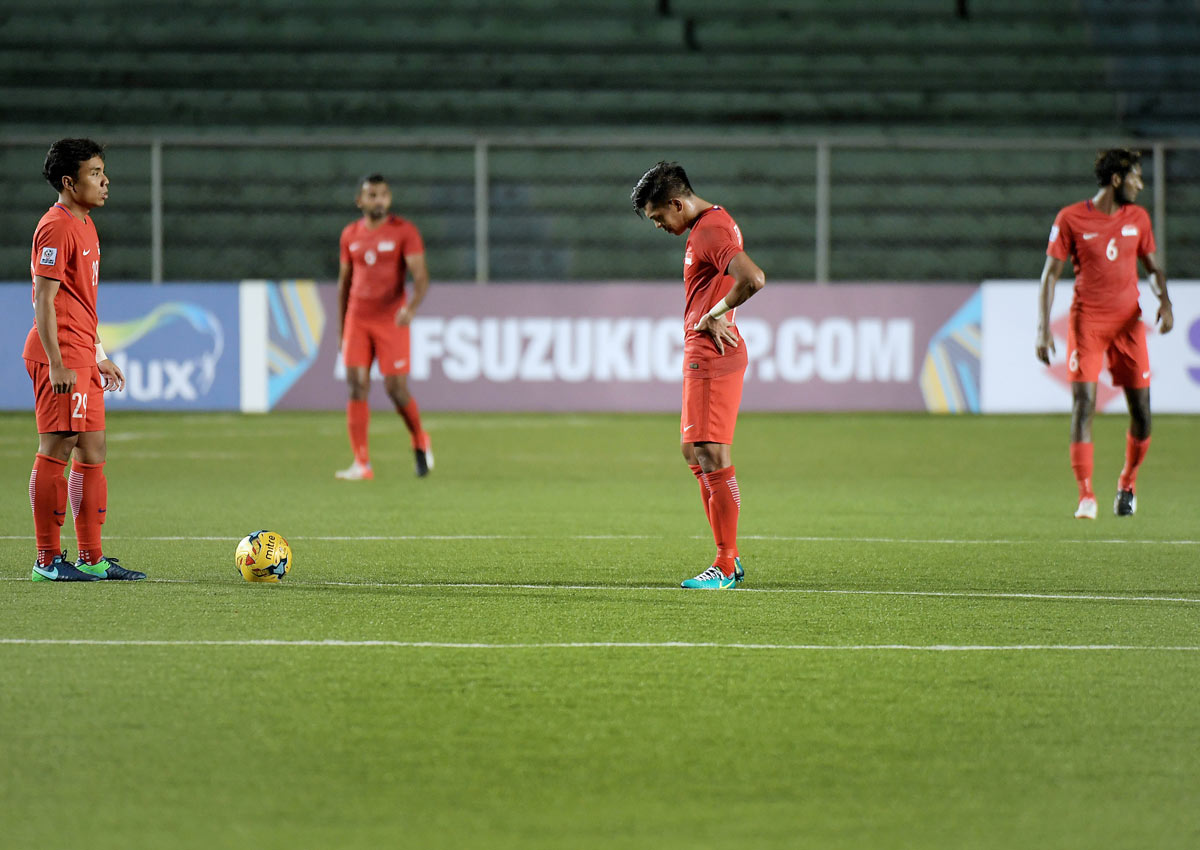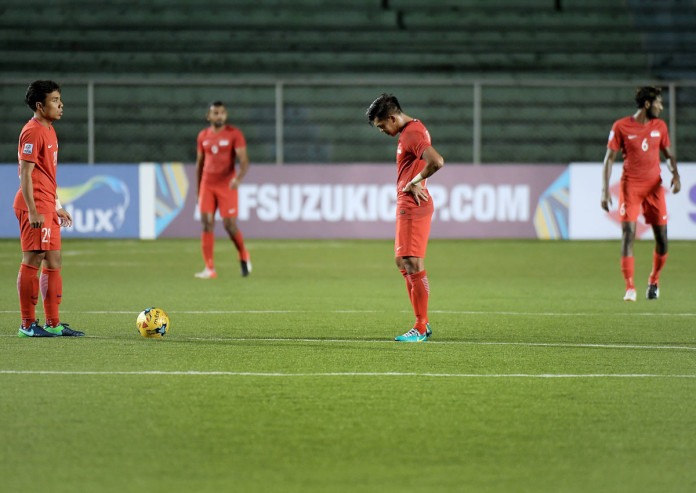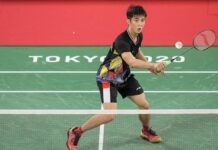The Singapore national football team slumped to their worst showing in the 20-year history of the Asean Football Federation (AFF) Suzuki Cup, drawing once and losing twice in the group stage in Manila. Here’s a look at the reasons for the disappointing campaign.
PREPARATION
Appointed in May following the release of Bernd Stange, national caretaker coach V. Sundramoorthy took the Lions on training tours of Qatar and Japan, where they played practice matches against club sides. Five official friendly games were also arranged in the last six months.
The Lions had good sparring practice against quality teams like Bahrain and Syria, whose standards are comparable or arguably superior to defending AFF Cup champion Thailand. But curiously, the Football Association of Singapore (FAS) has a tendency to organise friendlies with Cambodia – the Lions have met the Angkor Warriors four times in the last three years.
And Singapore even managed to lose one friendly to Cambodia (1-2), their first loss in 44 years to the fast-improving national side.
Based on Fifa rankings, Singapore (162nd) are a better team than Cambodia (168th). However, Sundram’s men have difficulty coping with them now, winning narrowly (1-0) and losing in their last two meetings.
Meanwhile, Thailand played friendlies against superior teams South Korea (lost 0-1), Qatar (0-3), Cameroon (2-3), Bahrain (1-1) and North Korea (0-1) in the last two years. Although they lost most of the games, the exposure to a higher level of football has helped the Thais dominate South-east Asia.
SQUAD SELECTION
Generally, Sundram picked the best players available at a time when the FAS’ developmental squads have not been very productive.
He went for two types of players – those from the LionsXII team that won the Malaysian Super League with him in 2013, and the hardened veterans from the Raddy Avramovic era. On paper, it was a good mix of players in their prime, 20-somethings like Hafiz Sujad and Faris Ramli, combining with the experienced heads like Hassan Sunny, 32, and Daniel Bennett, 38.
But while other teams brought 23 players with them – the maximum allowed to be registered under tournament rules – Sundram jetted 26 men over to Manila first, before eventually axing Nazrul Nazari, Afiq Yunos and Zulfahmi Arifin from the squad.
While this could be considered a way to keep players on their toes, it also led to uncertainty in the team and worse, gave the impression that the coach did not know who his best XI were.
And in a tournament which Singapore were unlikely to win, could Sundram not have been bolder by blooding young talents with a view to building for the future, instead of being reliant on old hands?
Rivals like the Philippines have regularly fielded 21-year-old defender Amani Aguinaldo, while Thailand have relied on 23-year-old dangerman Chanathip Songkrasin to open up defences.
Singapore’s top hopeful was M. Anumanthan, 22. Yet, while the midfielder was industrious against the Philippines, he was subdued against Thailand and Indonesia.
It was a far cry from the Lions’ triumphant 2004 campaign, in which Avramovic boldly gave opportunities to a young generation led by Shahril Ishak, Khairul Amri and Baihakki Khaizan, who all earned more than 100 caps each since.
TACTICS
Sundram is renowned, and some would even say, respected, for his pragmatism. And like a pragmatic coach who knows he has a slim chance of winning the AFF Cup, he set out his teams to ensure that they would not be embarrassed.
His defensive approach – which was even chided by opposing coaches such as Alfred Riedl – bore testament to that. The sight of a six-man backline whenever the Lions lost possession was evidence that the rearguard was his priority.
The Lions kept their shape for most of the goal-less draw against the Philippines. Against defending champions Thailand, a screen capture circulated on social media showed the entire 10 Singapore outfield players camped deep inside their own half against just five Thai opponents.
It was not everybody’s cup of tea, and in this tournament, it was ineffective. For instance, the more attack-minded Philippines conceded the same number of goals (three) as the Lions.
Meanwhile, an under-strength Indonesia bravely attacked and, even though they conceded seven goals and ended up with a negative goal difference, they were rewarded with a 2-1 win over Singapore and a place in the semi-finals.
It was ironic that when Singapore did decide to play a more expansive game in the do-or-die game against Indonesia, they were wasteful when chances fell their way, and two uncharacteristic lapses in concentration let the Garudas in to score the two killer strikes.
TEAM SPIRIT
Baihakki let fly with a tirade on Facebook on Wednesday, claiming that Sundram and an assistant coach, believed to be Firdaus Kassim, had been giving him the cold treatment.
How this incident of a senior player’s public disaffection with the team’s management affected the team’s morale is not known, although the players seemed to be in very good spirits when they trained the day after the incident.
At the Novotel Araneta – the official hotel for the AFF Cup – Thai, Filipino and Indonesian players dined together at the ground-floor restaurant and mingled freely but the Singapore team kept to themselves in a private room upstairs. The Lions’ tactics had already lost them many friends and this little act would no doubt have isolated them further.
Of greater concern is the Lions’ frustration with Sundram’s tactics.
The Sunday Times understands that not all players agreed with the coach’s defensive approach against the Azkals. Some felt that the Philippines, with a weakened defence and a toothless attack, were there for the taking.
The team’s dismay at playing defensive football was hinted at during interviews with the players, who said they were simply following the coach’s instructions and doing what they had been told.
OVERALL
There is very little to shout about in a campaign that went from bad to worse. From being crowned four-time winners of the AFF Cup just four years ago, the Lions are in danger of becoming a laughing stock.
Opponents have derided their defensive tactics, fans are venting their frustration on social media and even the players do not seem convinced by the strategy.
The failure of the Lions in the 2014 and 2016 Suzuki Cup tournaments, last year’s SEA Games flop on home soil, the numerous beatings the age-group teams have taken in the last two years and the continuing failure of the S-League to gain traction, all indicate that the future of Singapore football looks bleak.
This is a serious wake-up call for the FAS’ management, who have always maintained that the results speak for themselves.
A new management team will be elected soon. Hopefully, the FAS will seize this opportunity to embark on genuine reform – from management to coaches to player development.
Or it could arrange another friendly with Cambodia.
What’s next for the Lions?
Q: What went wrong with the Lions’ AFF Suzuki Cup campaign?
“Football is all about scoring goals. Much as we want to deny opponents from scoring, when we have an opportunity, we must make good use of it.
“Maybe we have to be bold and daring, like Indonesia – conceded seven, scored six, but still made the semi-finals. They were down 1-0 against the Lions, but still persevered and it paid off in the end. This sort of tenacity is what people like to see in football.”
JITA SINGH, former Lions coach
“The way we played, we didn’t really deserve anything. We were just hoping to get some luck, and that’s never nice to say. The performances were just very messy, to be honest.
“But we shouldn’t blame players. They did what they could do. I really felt sick watching our boys lose because they really tried their best.”
ALEKSANDAR DURIC, former national striker
Q: Is this rock bottom for the Lions? Will this dreadful slump persist?
“They have a good chance of qualifying for the 2019 Asian Cup and they should focus on that. They should come back, take stock of what went wrong, improve and move on.”
RADDY AVRAMOVIC, former Lions coach
“It’s time to re-organise and start from zero, it’s the only way we can improve. We need so many generations of players, we need a clear grassroots programme.
“Our league is not strong anymore. We can see all the other countries – if there is strong league, there will be a strong national team.
“We’ve wanted instant success, but we have to be patient. We need to fight to get belief and trust from people. In five or six years, maybe we can show some positive moments.”
ALEKSANDAR DURIC
Q: Should V. Sundramoorthy stay on to guide the Lions through the doldrums?
“The FAS didn’t really believe in him, they put Sundram under pressure from the start. The caretaker term means he needed to deliver to save his job. Because of that, he started off with too much pressure on himself and players.
“We shouldn’t blame him, he probably thinks he’d be removed next year, but from the start everything was wrong with the appointment.”
ALEKSANDAR DURIC
“I cannot say Sundram is wrong in playing the way he did. Even by parking the bus, he still had a few clear chances. No other team was able to do that – defend so well and still be able to have scoring chances.”
JITA SINGH
meng@sph.com.sg

This article was first published on Nov 27, 2016.
Get a copy of The Straits Times or go to straitstimes.com for more stories.







